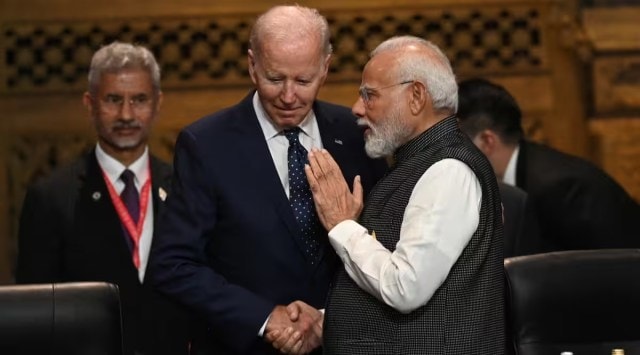India-Canada standoff | At G20 meet, Joe Biden raised Nijjar’s killing with PM Modi: FT report
According to the Financial Times, several members of the Five Eyes — an intelligence-sharing network that includes the US, UK, Canada, Australia and New Zealand — raised the killing of Hardeep Singh Nijjar with Modi.
 US president Joe Biden with Prime Minister Narendra Modi. (Reuter/File)
US president Joe Biden with Prime Minister Narendra Modi. (Reuter/File) US President Joe Biden and other Western leaders had expressed concern to Prime Minister Narendra Modi about Canadian claims that agents linked to New Delhi were involved in the murder of a Sikh separatist in Vancouver when they met him at the G20 Summit earlier this month, The Financial Times has reported.
According to the FT, several members of the Five Eyes — an intelligence-sharing network that includes the US, UK, Canada, Australia and New Zealand — raised the killing of Hardeep Singh Nijjar with Modi.
“One said Biden felt it was important to address the issue directly with his Indian counterpart. The White House declined to comment on whether Biden had discussed the issue with Modi at the G20. The leaders intervened at the G20 Summit after Canada urged its allies to raise the case directly with Modi, said two people familiar with the situation, who added Ottawa asked them to mention the claims in private,” the FT reported.
While there was no official word from New Delhi on this report, after the meeting between Biden and Modi, the readouts of the meeting did not mention any such conversation.
Biden has been invited by Modi for the Republic Day in 2024 during their meeting, US Ambassador Eric Garcetti had said last Wednesday.
On September 8, the day before the G20 summit began and barely three months after the Indo-US joint statement hailed ties spanning “seas to stars,” Modi and Biden had made progress in a sweeping range of areas they had flagged last June: from space research and cancer to critical tech and small modular nuclear reactors.
Their 29-paragraph joint statement had focused exclusively on the bilateral agenda. Unlike the 58-paragraph statement last June during PM Modi’s state visit to the US, it had made no mention of regional and global issues, counter-terrorism or situation in the neighbourhood including Afghanistan, Pakistan and Myanmar.
After the meeting, the Prime Minister’s Office had said: “The two leaders also exchanged views on a number of regional and global issues. They agreed that the India-US partnership was beneficial not only for the people of the two countries but also for global good.” Modi tweeted, “Our meeting was very productive. We were able to discuss numerous topics which will further economic and people-to-people linkages between India and USA. The friendship between our nations will continue to play a great role in furthering global good.”
Echoing the June statement, the joint statement had said that both leaders “re-emphasized that the shared values of freedom, democracy, human rights, inclusion, pluralism, and equal opportunities for all citizens are critical to the success our countries enjoy and that these values strengthen our relationship.”
On September 18, Canadian Prime Minister Justin Trudeau told his Parliament on September 18, “Over the past number of weeks Canadian security agencies have been actively pursuing credible allegations of a potential link between agents of the Government of India and the killing of a Canadian citizen, Hardeep Singh Nijjar.”
Calling these allegations “absurd” and “motivated,” New Delhi accused Ottawa of not acting against the Khalistan separatists in Canada and not sharing any specific information on the killing of Nijjar. At the same time, it has opened a window for cooperation, saying if any specific information is provided, New Delhi will be willing to look into it.
The New York Times has reported that the US provided Canada with intelligence after the killing of Nijjar but communications intercepted by Ottawa were more definitive and led it to accuse India of orchestrating the plot.
Ever since the India-Canada diplomatic standoff began, at least five senior US officials and diplomats – US Secretary of State Antony Blinken, NSA Jake Sullivan, National Security Council Coordinator for Strategic Communications John Kirby, Garcetti and US Ambassador to Canada David Cohen – have made public statements with a nuanced message for both sides. In short, asking Delhi to cooperate, but also urging Ottawa not to jump the gun.
Over the last week, the US has emerged as the interlocutor between Ottawa and Delhi. Indeed, backchannel talks between Delhi and Ottawa are being explored via Washington DC, as External Affairs Minister S Jaishankar is going to meet US officials there.








